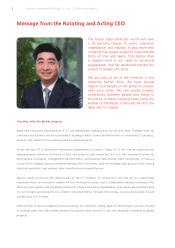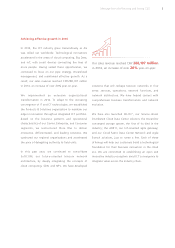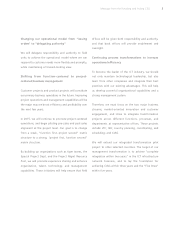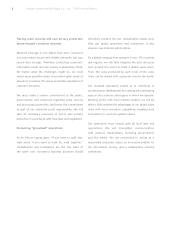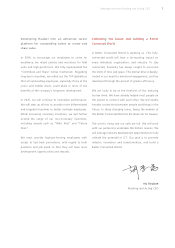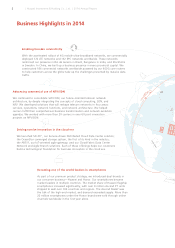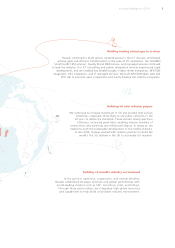Huawei 2014 Annual Report Download - page 14
Download and view the complete annual report
Please find page 14 of the 2014 Huawei annual report below. You can navigate through the pages in the report by either clicking on the pages listed below, or by using the keyword search tool below to find specific information within the annual report.
12 Huawei Investment & Holding Co., Ltd. 2014 Annual Report
Huawei has also shared its ICT expertise with local
communities in many countries, helped them build
effective education systems with ICT technologies, and
nurtured local ICT talent. In fact, we have launched
our Seeds for the Future program for this very purpose.
This program, which has been introduced in more than
30 countries, has benefited more than 10,000 students
from 100 plus universities.
Building an industry ecosystem
As the physical and digital worlds continue to merge,
companies operating in isolation will find it hard to
satisfy all customer needs. Rather, forging partnerships
with an open mind and pooling the best resources and
capabilities are necessary to help customers succeed and
industries develop.
We are working with various industries – especially those
likely to use public networks in the IoT era – to define
5G standards. These include raising spectrum efficiency,
increasing peak rates, enabling massive numbers of
connections, and achieving one-millisecond latency.
In doing so, we are helping to push the sustainable
development of the mobile industry. In late 2014,
Huawei worked with industry partners to build the
world's first 5G testbed in the UK, which will greatly
accelerate 5G research.
In the spirit of openness and win-win cooperation,
Huawei has formed strategic alliances and global
partnerships with leading companies such as SAP,
Accenture, Intel, and Infosys to pool the best resources
and capabilities and build a sound industry ecosystem.
Enhancing cyber security
Ubiquitous networks are changing the way we work
and live. While this presents many opportunities, it also
poses new challenges to global security. Faced with such
complex needs and risks, it is imperative that we make
the correct choices.
On December 3, 2014, we released the third annual
white paper on cyber security in Berlin: Cyber Security
Perspectives: 100 requirements when considering end-
to-end cyber security with your technology vendors.
This is a positive step Huawei is taking to establish
cyber security policies and standards. At the same time,
we hope to inspire more businesses, policy advisers,
suppliers, and buyers to think about and act on cyber
security policies and standards.
Huawei will also make a commitment to the public,
governments, and customers to protect user privacy,
just as we have done on cyber security. We will honor
this commitment as a responsible corporate citizen.
We are well aware that ensuring secure and stable
network operations is our most important mission and
corporate social responsibility. At critical moments,
network failures could affect rescue efforts and delay
the reporting of disasters, which in turn may cause
significant losses to life and property. When a crisis
occurs, you will find Huawei employees heading towards
it or at its center while others are fleeing. This has
always been the case, for example, during the Fukushima
nuclear disaster, the 2010 Chilean earthquake, the
current Ebola outbreak in Sierra Leone, and in war-torn
countries and regions.


